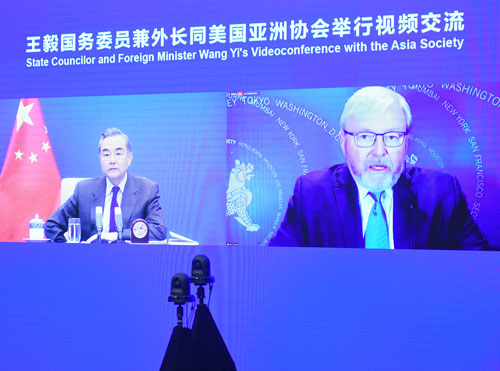
The People’s Republic of China


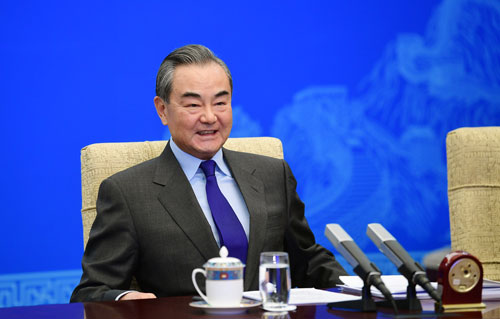
On the evening of December 18, 2020, State Councilor and Foreign Minister Wang Yi held a videoconference with the Asia Society in Beijing.
Wang Yi said the outgoing 2020 has witnessed the sudden onslaught of COVID-19, a pandemic that has upended the world in almost all aspects. Countries have come to realize more than ever that global challenges require enhanced international coordination and cooperation, and that major countries in particular should lead by example. However, China-U.S. relations have spiraled down to the lowest level since the establishment of diplomatic ties 41 years ago due to the fact that the U.S. side has interfered in China's internal affairs and harmed China's interests on a series of issues. This is clearly not in the interests of the Chinese and American peoples, nor is it helpful when global efforts are needed to overcome the difficulties.
Wang Yi said 2020 might have witnessed the greatest damage to the international order and international relations. Power politics is jeopardizing international stability. Protectionism is jeopardizing international trade. Unilateralism is jeopardizing international cooperation. McCarthyism is jeopardizing international exchanges. These risks and challenges facing us are unprecedented. China and the United States should form the right perception about one another, act in line with the trend of the times, and heed the aspirations of the international community. The two countries need to step up to the responsibilities as major countries and at the same time, work together with other countries to overcome difficulties, meet challenges and pursue development.
Wang Yi stressed that China follows an independent foreign policy of peace, and seeks to engage other countries for friendship and cooperation on the basis of the Five Principles of Peaceful Coexistence, and to play a constructive role for world peace and development. China has no intention to compete for hegemony, and never interferes in other's internal affairs. China doesn't export its system or model. Not in the least does China seek spheres of influence. China's diplomacy is for the development of the nation, for win-win outcome, and for equity.
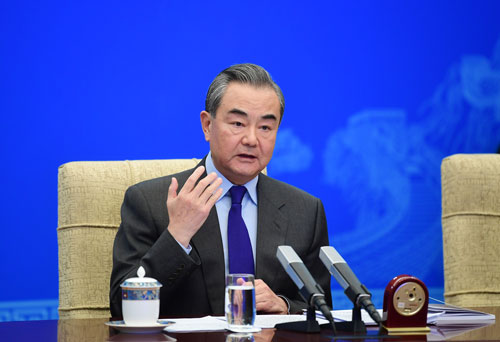
Wang Yi pointed out that China stays committed to developing a relationship based on coordination, cooperation and stability with the United States under the principle of no conflict, no confrontation, mutual respect and win-win cooperation. China has been working in good faith to that goal. Regrettably however, senior U.S. officials frequently pointed fingers at China, accusing China with merely irresponsible presumption of guilt and emotional lashing out. The fundamental reason behind all this is that some U.S. politicians have strategic miscalculations about China. First, they choose to ignore the vast common interests and room for cooperation between the two countries, insist that China is a main threat, and mobilize all resources available to take on China, which is going in a wrong direction. Second, they seek to defame the Communist Party of China (CPC) out of ideological bias. The CPC, as the constitutionally recognized ruling party of China, has a close bond and a shared future with the Chinese people. An attack on the CPC is an attack on the 1.4 billion Chinese people. It is doomed to fail. Third, they hope that maximum pressure will make China give in. China was once bullied by western powers, but those days are long gone. Power politics will only get the Chinese people to be more resolved in their response. Fourth, they attempt to build an international coalition against China. But the overwhelming majority of the countries across the world do not want to take sides, let alone being forced into confrontation with China. Facts have proved, and will continue to prove, that these attempts find no support and will lead nowhere. China hopes the U.S. policy toward China could return to objectivity and sensibility as early as possible.
Wang Yi stressed that China's policy toward the United States is always stable and consistent. With deeply interwoven interests between the two countries, neither can do without the other, remodel the other, or replace the other. The bilateral relationship is no zero-sum game; the success of one does not have to entail the other's failure. While China-U.S. cooperation can make great things happen for the two countries and the entire world, China-U.S. confrontation would definitely spell disaster for not only the two countries but also humanity as a whole.
Wang Yi said the time has come to decide the future course of this giant vessel of China-U.S. relationship. It is hoped that the U.S. side will join China in rebuilding the strategic framework for the healthy and steady growth of China-U.S. relations on the basis of mutual respect, through dialogue and consultation, and by way of deepening our common interests and enhancing the support by the people. The two countries should restart dialogue, return bilateral relations to the right track, rebuild mutual trust, and expand cooperation and manage differences through dialogue. At present, the two countries can cooperate in the fight against COVID-19, economic recovery, climate change and other wider fields.
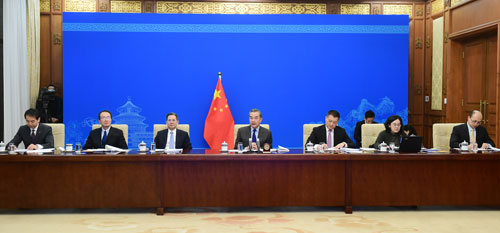
Wang Yi said that China never shies away from our differences. China's stance is that the two sides should manage constructively the prominent and important issues based on a right perception of each other.
First, on ideological issues, we need to respect each other's choice of system and development path. The goal of China-U.S. engagement is not to mold the other in one's own image, still less to defeat the other side. Both Chinese and American systems are chosen by their people and deeply rooted in their respective historical and cultural traditions. If the U.S. policy toward China were to remodel or even subvert China, it would not be achievable. The right approach is to respect each other's political system and development path, maintain peaceful coexistence, and promote win-win cooperation.
Second, on issues concerning national sovereignty and territorial integrity, we need to commit to the international norm of non-interference in other's internal affairs. Issues relating to Taiwan, Hong Kong, Tibet and Xinjiang are China's internal affairs and involve China's core interests. None of them shall be subject to foreign interference. The U.S. executive branch and Congress exercised long-arm jurisdiction on Chinese businesses and individuals on the basis of false information, which seriously violates international law and defies international justice and conscience. As an independent sovereign state, China naturally has to respond. We shall not allow the law of the jungle to govern our world again.
Third, on trade issues, we need to replace confrontation and sanctions with dialogue and consultation. China-U.S. trade is mutually beneficial in nature. There are no winners in trade wars. What has happened proves that pressuring others with tariffs would only boomerang. The two sides need to remove man-made barriers and instill positive expectations for the sound development of China-U.S. economic and trade cooperation. China is firmly advancing supply-side structural reform according to its own pace, and building a new system of open economy of higher standards. The U.S. side should stop overstretching the notion of national security, stop the arbitrary suppression of Chinese companies, and provide an open, fair and non-discriminatory environment for Chinese businesses and investors.
Fourth, on maritime issues, we need to strive to turn frictions into cooperation. There has been no problem with the freedom of navigation and overflight in the South China Sea. China will work with countries in the region to maintain the freedom of navigation and overflight under international law, and speed up consultations with ASEAN countries toward a Code of Conduct in the South China Sea, which will regulate behaviors on the sea and underline the principle of peaceful settlement of disputes. The two countries share common interests in maintaining freedom of navigation, protecting the marine environment and harnessing marine resources. The two sides can explore possibilities of cooperation in those areas, and engage in positive interactions on maritime issues.
Fifth, on people-to-people exchange, we need to remove restrictions as soon as possible. China has no intention to pick a fight with the United States either in diplomacy, media or other fields. People with vision in both countries should jointly reject the attempts to disrupt people-to-people contact and create a cultural decoupling between the two countries, jointly oppose stigmatizing people-to-people exchange and politicizing normal contact, and remove stumbling blocks to such contact and exchange.
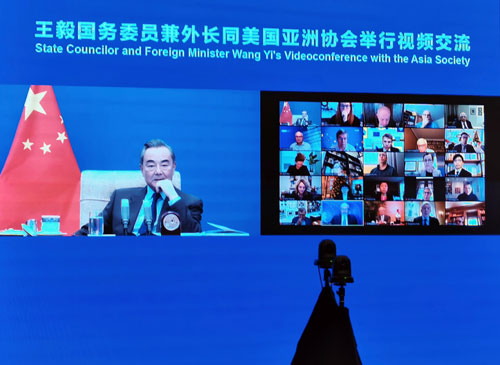
Wang Yi also answered a series of questions raised by foreign representatives and elaborated on China's principle and position on China-U.S. economic and trade cooperation, scientific and technological competition, Taiwan issue, "wolf-warrior diplomacy" and other issues.
More than 100 representatives of the U.S. strategic circles and members of the Asia Society, including President-elect of the Asia Society and former Australian Prime Minister Kevin Rudd, current President of Asia Society Josette Sheeran, Global Co-Chair of Asia Society John L. Thornton, Global Co-Chair of Asia Society and former Ambassador of Singapore to the U.S. Chan Heng Chee, Pakistan's former Prime Minister Shaukat Aziz, former U.S. Deputy Secretary of State John D. Negroponte, former U.S. Deputy Secretary of State Robert D. Hormats, former U.S. Assistant Secretary of State for East Asian and Pacific Affairs Daniel R. Russel, former U.S. Deputy Trade Representative Wendy Cutler, former U.S. Acting Assistant Secretary of State Susan A. Thornton, and Professor of Harvard University Graham Allison, participated in the online exchanges.
Foreign representatives attending the meeting said that the U.S.-China relationship has experienced ups and downs in the past 40 years and achieved many results, and it is currently in the most difficult period in half a century. Countries around the world generally oppose protectionism and resist the revival of "McCarthyism", hoping to see more stable and predictable U.S.-China relations. All parties appreciate China's positive role in responding to global challenges such as climate change and its constructive suggestions to push the U.S.-China relationship back on track. They hope that the U.S. and China will shoulder their responsibilities as major countries, develop cooperation in fields such as COVID-19 response and climate change, and engage in candid dialogue and constructive management in areas of disagreement.
